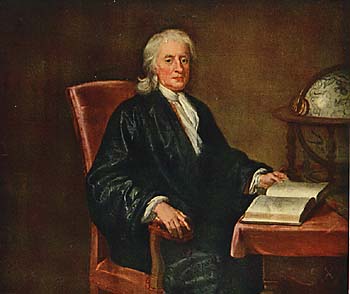 Sir
Isaac Newton (1642–1727)
Sir
Isaac Newton (1642–1727) Toward a defintion of "Enlightenment"
Three brief passages from Immanuel Kant's 1784 essay, "An Answer to the Question: What is Enlightenment?"
"Enlightenment is mankind's exit from its self-incurred immaturity."
"Sapere aude! (Dare to Know!) Have the courage to use your own understanding! is thus the motto of enlightenment!"
"If it is asked 'Do we now live in an enlightened age?' the answer is 'No, but we do live in an age of enlightenment'"
How does Enlightenment work?
Example of Newton:
 Sir
Isaac Newton (1642–1727)
Sir
Isaac Newton (1642–1727)
Science seemed powerful: it was unlocking the secrets of nature.
Thus the paradox: the more one discovered, the more one knows one doesn’t know; the more light you have the more dark you can see.
"I seem to have been only like a boy playing on the seashore, and diverting myself in now and then finding a smoother pebble or a prettier shell than ordinary, whilst the great ocean of truth lay all undiscovered before me."
At the center of the word "en-light-enment" is the word "light",
This word uses a metaphor to effect a transport of meaning:
since light allows one à to see,
and it is said that by seeing à one knows
then this is an age when both men and women are moving beyond their dark prejudices into the light of knowledge.
Enlightenment Commerce:
The 18th century witnessed a vast expansion of trade, colonization, and production; and this brought an extraordinary new accumulation of wealth.
But, the paradox about the new market economy: Bernard Mandeville (in 1714) demonstrates how
private vices (like vanity, conspicuous consumption) produce à
public virtues (like national wealth)
Paradox: if we were all virtuously content with our lot, and abstained from unnecessary consumption, the modern economy would collapse, and the nation would become poor, and too weak to defend itself.
The story of the miser and the highwayman: who benefits the economy most?
Enlightenment Information Revolution:
The increase in the circulation of print based information meant that more and more readers could claim public knowledge of the world.
BUT, the rise of the freely inquiring critical reader breeds discontent:
the more citizens read the more they know,
the more they know the more they question traditional hierarchies—for example, the monarch’s position as ruler of the people, man’s authority over women, and the master’s ownership of the slave.
Liberty becomes a problem: If the liberty of the individual is prior to any social and political group, what concept will secure the legitimacy of governments?
Enlightened morality?
Enlightenment thinkers of the 18th century realized that increases in knowledge, wealth and education did not, by themselves, necessarily make people good.
Skeptics about enlightenment: Swift and Pope:
Knowledge à pride;
Wealth à corrupt;
Colonies à expand the scope of vice.
Nonetheless, many writers of the period hope that the reading of the right kind of print media, might guide readers into living better lives, for example, by allowing them to see and feel from an other’s point of view, or by making them more sensitive to the suffering of others.